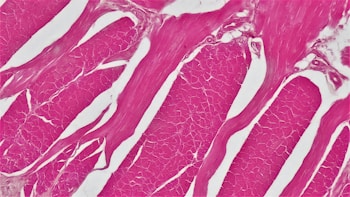 Appearance Vocabulary in Spanish
Appearance Vocabulary in Spanish
A collection of Spanish words that describe physical appearances. Ideal for English students learning Spanish.

esquelético
The Spanish word 'esquelético' translates into English as 'skeletal'. It is used as an adjective and often describes something that is very thin, like a skeleton, or something related to a skeleton. For example, in anatomy or in biological fields, 'esquelético' might refer to a system or structure that is skeletal, such as 'músculo esquelético' translates as 'skeletal muscle'.
estar arrugado como una pasa
estar calvo
'Estar calvo' is a Spanish phrase used to describe the state of being bald in English. It is commonly utilized when talking about individuals who lack hair on their head. This phrase comprises of 'estar' which is a verb that signals a state or condition, and 'calvo', an adjective signifying 'bald'.
estar como un fideo
The Spanish phrase 'estar como un fideo' is an idiomatic expression that translates literally to 'being like a noodle' in English. It's used to describe someone who is very thin, just like a noodle. The phrase could be derogatory or affectionate depending on the context, implying that the person needs to eat more or is slender and fit. Like most idiomatic expressions, it is quite common in informal and colloquial settings.
estar como un tonel
The Spanish phrase 'estar como un tonel' directly translates to 'being like a barrel' in English. However, it is an idiomatic expression frequently used in conversational Spanish. It is not meant to be taken literally. Instead, it refers to someone who is excessively overweight or rotund. This phrase is used to lightly and humorously convey this meaning without directly calling someone fat.
estar como una vaca
The phrase 'estar como una vaca' in Spanish is an idiomatic expression, generally used in informal settings. Although the literal translation is 'being like a cow', this phrase actually has a metaphorical meaning rather than a direct comparison to a cow. When someone uses this phrase, they don't mean that a person is behaving like a cow. Instead, they are using a cultural reference to imply that the person is overweight or has put on weight. Using animal comparisons in idioms is common in many languages, as it provides a visual and widely understood point of reference.
estar moreno
The Spanish phrase 'estar moreno' is often used to describe a person's complexion or skin tone. In English, it can be roughly translated to 'to be dark' or 'to be tan'. It is typically used to describe someone who has a darker or tanned skin color, possibly due to sun exposure or natural pigmentation. It's important to note that the term 'moreno' itself can also be used to describe hair color — similar to 'brunette' in English. The usage depends on the context.

expresión
The Spanish word 'expresión' translates to 'expression' in English. This term can refer to something that is said, a way of saying something, or the process of making one's thoughts, feelings, or ideas known to others, often through speech, writing or some form of art. Additionally, it can also denote a mathematical or computational statement that represents a particular operation or series of operations.
expresión alegre
expresión amable
The Spanish phrase 'expresión amable' translates to 'kind expression' in English. This can refer to a facial expression that is kind or friendly, or to any expression, verbal or nonverbal, that conveys kindness. It is a compound noun, made up of the word 'expresión' meaning expression, and 'amable' meaning kind or friendly.
expresión duro
The Spanish term 'expresión duro' translates to 'hard expression' in English. It can be used metaphorically to describe a stern or serious facial expression. However, it is not commonly used in daily conversation. It is more common to refer to a stern look as 'mirada dura', particularly if the context relates to describing someone's intimidating or intense stare.
expresión franco
The term 'expresión franco' in Spanish translates to 'expression franc' in English. This phrase can be used in a specific context where 'franco' is often referred to as 'frank' in English. So 'expresión franco' can also imply a 'frank expression' or 'open expression' while conversing in Spanish. The overall connotation of 'expresión franco' draws its essence from frankness and transparency in communication in the Spanish language.
expresión frío
The word 'expresión frío' is a Spanish term that is translated into English as 'cold expression'. Generally, it refers to a facial expression that comes off as unemotional, impersonal, or distantly professional. It can be used to describe someone who is not showing any warm or friendly feelings. It may be used metaphorically, to say that someone isn't expressing any emotions, or literally, to mean that someone's face is physically cold. Note that 'frío' actually means 'cold', and 'expresión' means 'expression'. The concept is somewhat similar to the English term 'poker face'.
faz melancólico
faz mustio
feo
This term 'feo' explains the aesthetic quality characterized by various degrees of unattractiveness.
Example sentences with feo →
fofo

gesto
The word 'gesto' in Spanish translates to 'gesture' in English. It refers to a movement or position of the hand, arm, body, head, or face that expresses a particular attitude or meaning. Gestures are used in everyday life as a form of non-verbal communication and carry their own significance across different cultures. It can be used in various contexts in Spanish, similar to its use in English. It can indicate a physical action or a subtle sign of a certain emotion or opinion. Examples of usage in a sentence could include 'El hizo un gesto con la mano' which means 'He made a gesture with his hand'.
gesto amable
The term 'gesto amable' in Spanish translates to 'friendly gesture' in English. It refers to acts performed with a kindness or generosity of spirit that are intended to be helpful or kind to someone else. A friendly gesture is particularly characterized by its informal, everyday nature and general air of goodwill.
gesto duro
gesto frío
The Spanish term 'gesto frío' translates to 'cold gesture' in English. This can refer to an action or expression that is perceived to be unfriendly, unemotional, or devoid of warmth. It is often used to describe interpersonal interactions where there is a lack of kindness, empathy, or affection. Please note that, like many phrases, the exact connotation can depend on the context in which it is used.

gordinflón

grueso
hacerse la cirugía estética
The Spanish phrase 'hacerse la cirugía estética' translates to 'to get cosmetic surgery' in English. This phrase is commonly used in the context of discussing aesthetic body modifications, particularly those done voluntarily to enhance or alter one's appearance according to personal preferences. Such surgery includes, but not limited to, rhinoplasty (nose job), liposuction, breast augmentation, and others.
Example sentences with hacerse la cirugía estética →hacerse la manicura
The phrase 'hacerse la manicura' in Spanish translates to 'get a manicure' in English. It is used when someone is having their fingernails cleaned, trimmed, shaped, or painted usually at a beauty salon or spa. However, the term can also be used when someone does a manicure for themselves at home. The phrase is mainly used by women, but is not exclusive to them, as men can also 'hacerse la manicura'.
Example sentences with hacerse la manicura →hacerse un corte (de pelo) atrevido
The phrase 'hacerse un corte (de pelo) atrevido' in Spanish translates to 'make a bold (hair) cut' in English. It could be used when someone decides to change their hairstyle radically. For instance, if a person with long hair decides to cut it very short or in an unconventional style, they are 'haciéndose un corte de pelo atrevido'. It's not limited to hair and can be used in other contexts where one makes a bold or daring choice.
Example sentences with hacerse un corte (de pelo) atrevido →hacerse un moño
The Spanish phrase 'hacerse un moño' translates as 'make a bun' in English. It is often used to describe the process of styling hair into a bun, a type of hairstyle where the hair is pulled back from the face, twisted or plaited, and wrapped in a circular coil around itself, typically on the back of the head or neck. However, it can also be used figuratively in different contexts.
Example sentences with hacerse un moño →hacerse una coleta
The Spanish phrase 'hacerse una coleta' translates to 'make a ponytail' in English. It is a casual phrase typically used in the context of hairstyles, especially referring to the style in which the hair is pulled back and bound usually at the back of the head.
Example sentences with hacerse una coleta →hacerse una liposucción
The Spanish term 'hacerse una liposucción' translates to 'to get liposuction' in English. Liposuction is a cosmetic surgery procedure where excess fat is removed from different parts of the body. It's used to reshape particular areas or to improve body contours. In Spanish, the term 'hacerse una liposucción' can be broken down to 'hacerse' which is the reflexive form of 'hacer' meaning 'to do or make', 'una' meaning 'a', and 'liposucción' which is the same term for 'liposuction'. So, in essence, 'hacerse una liposucción' literally means 'to do or make a liposuction' which is understood as 'to get liposuction'.
Example sentences with hacerse una liposucción →hacerse una trenza
The Spanish phrase 'hacerse una trenza' translates to 'to make a braid' in English. This verb phrase is commonly used to describe the action of weaving three or more strands of hair, rope, or other material together in a specific pattern to form a distinct hairstyle or design. 'Hacerse' is a reflexive verb form of 'hacer', meaning 'to do' or 'to make', where 'se' indicates that the action is performed on oneself. 'Una trenza' translates to 'a braid'. Therefore, when you 'hace una trenza' (make a braid) on yourself, you 'te haces una trenza' (are making a braid on yourself).
Example sentences with hacerse una trenza →